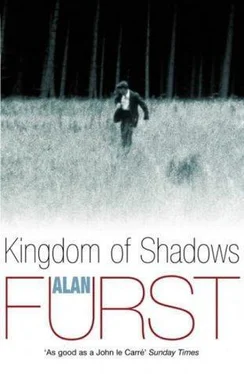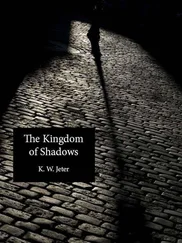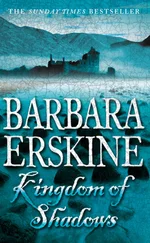Alan Furst - Kingdom of Shadows
Здесь есть возможность читать онлайн «Alan Furst - Kingdom of Shadows» весь текст электронной книги совершенно бесплатно (целиком полную версию без сокращений). В некоторых случаях можно слушать аудио, скачать через торрент в формате fb2 и присутствует краткое содержание. Жанр: Шпионский детектив, на английском языке. Описание произведения, (предисловие) а так же отзывы посетителей доступны на портале библиотеки ЛибКат.
- Название:Kingdom of Shadows
- Автор:
- Жанр:
- Год:неизвестен
- ISBN:нет данных
- Рейтинг книги:5 / 5. Голосов: 1
-
Избранное:Добавить в избранное
- Отзывы:
-
Ваша оценка:
- 100
- 1
- 2
- 3
- 4
- 5
Kingdom of Shadows: краткое содержание, описание и аннотация
Предлагаем к чтению аннотацию, описание, краткое содержание или предисловие (зависит от того, что написал сам автор книги «Kingdom of Shadows»). Если вы не нашли необходимую информацию о книге — напишите в комментариях, мы постараемся отыскать её.
Kingdom of Shadows — читать онлайн бесплатно полную книгу (весь текст) целиком
Ниже представлен текст книги, разбитый по страницам. Система сохранения места последней прочитанной страницы, позволяет с удобством читать онлайн бесплатно книгу «Kingdom of Shadows», без необходимости каждый раз заново искать на чём Вы остановились. Поставьте закладку, и сможете в любой момент перейти на страницу, на которой закончили чтение.
Интервал:
Закладка:
“Monsieur?”
“What’s for lunch today?”
“Tete de veau.”
“How is it?”
“Not too bad.”
“I think I’ll have some. Nicholas?”
Morath shook his head. He placed a small packet on the table. The size of a hand, it was wrapped in very old, yellowed muslin, perhaps a piece cut from a curtain a long time ago. He unfolded the fabric, revealing a silver cross on a faded ribbon, black and gold, the colors of Austria-Hungary. “This he sent to you.”
Polanyi sighed. “Sandor,” he said, as though the coachman could hear him. He picked up the medal, let it lie flat on his open hand. “A Silver Cross of Valor. You know, Nicholas, I’m honored, but this is worth something.”
Morath nodded. “I offered it to the daughter, with your kindest sympathies, but she wouldn’t hear of it.”
“No. Of course not.”
“When is it from?”
Polanyi thought for a time. “The late eighties, as near as I can work it out. A Serbian rising, down in the Banat. Sandor was a sergeant, in the regiment raised in Pozsony. It was Pressburg then.”
“Bratislava, now.”
“The same place, before they gave it to the Slovaks. Anyhow, he used to talk about it, now and then. The Serbs gave them a hard time, they had snipers up in the caves, on the hillsides. Sandor’s company spent a week dealing with that-some villages had to be burnt down-and he got the cross.”
“He wanted you to have it.”
Polanyi nodded that he understood. “Is anything left, up there?”
“Not much. They stripped the house, after the border moved. Doorknobs, windows, the good floors, fireplace brick, chimneys, whatever pipe they could get out of the walls. The livestock’s long gone, of course. Some of the vineyard remains. The older fruit trees.”
“ Nem, nem, soha,” Polanyi said. No, no, never-the Hungarian rejection of Trianon, the treaty that took away two thirds of its land and people after the Austro-Hungarian army was defeated in the Great War. There was more than a touch of irony in Polanyi’s voice when he said it, a shrug, all we can do is whine, but that wasn’t all. In some sense, complex, possibly obscure, he meant it.
“One day, perhaps, it comes back.”
The group at the next table had been attentive. One pugnacious little man, balding, nostrils flared, the reek of his mildewed room floating over their aperitifs, said “Revanchiste.” He didn’t say it to them, quite, or to his friends, perhaps he meant it for the world at large.
They looked at him. Revanchist, irredentist Hungarian fascists, he meant, seething with Red Front indignation. But Morath and Polanyi were not that, they were of the Hungarian Nation, as the nobility was called, Magyars with family histories that went back a thousand years, and they were quite prepared, with chair leg and wine bottle, to throw the whole crowd out into the rue Beaujolais.
When the group at the next table had returned, ostentatiously, to minding its own business, Polanyi carefully folded the medal back into its wrapping and put it in the inside pocket of his jacket.
“He spent a long time dying,” Morath said. “Not in pain, and he wasn’t sad-he just had a hardheaded soul, it didn’t want to go.”
From Polanyi, a tender little snort of pleasure as he tasted the veal.
“Also,” Morath went on, “he wanted me to tell you something.”
Polanyi raised his eyebrows.
“It had to do with the death of his grandfather, who was ninety-five, he thought, and who had died in the same bed. The family knew the time had come, they were all gathered around. Suddenly, the old man became agitated and started to talk. Sandor had to lean close in order to hear him. ‘Remember,’ he whispered, ‘life is like licking honey …’ He said it three or four times, and Sandor could tell there was more. At last, he managed-‘licking honey off a thorn.’ “
Polanyi smiled, acknowledging the story. “It’s been twenty years,” he said, “since I saw him. When it was no longer Hungary, I didn’t want anything to do with it, I knew it would be destroyed.” He took a sip of the wine, then more. “You want some, Nicholas? I’ll have them bring a glass.”
“No, thank you.”
“I wouldn’t go up there,” Polanyi said. “That was weak. And I knew it.” He shrugged, forgiving himself.
“He didn’t hold it against you.”
“No, he understood. His family was there?”
“All sorts. Daughters, a son, nieces and nephews, his brother.”
“Ferenc.”
“Yes, Ferenc. They had all the mirrors turned around. One old lady-immense, she cried, she laughed, she cooked me an egg-couldn’t stop talking about it. When the soul leaves, it mustn’t ever be allowed to see itself in the mirror. Because, she said, if it did, it might like looking at itself, and then it would be back, again and again.”
“I don’t think mine would. Did they put out the tub of water?”
“By the door. For death to wash his scythe. Otherwise, he would have to go all the way down to the creek, and somebody else in the house would die within the year.”
Polanyi daintily ate a chunk of bread he’d soaked in the sauce. When he looked up, the waiter was just passing by. “Hyacinthe, s’il vous plait, a glass for my nephew here. And, while you’re at it, another carafe.”
They walked in the Palais Royal gardens after lunch. A dark afternoon, perpetual dusk, Polanyi and Morath like two ghosts in overcoats, moving slowly past the gray branches of the winter parterre.
Polanyi wanted to hear about Austria-he knew that Wehrmacht units were poised on the borders, ready to march in to suppress the “riots” organized by the Austrian Nazis. “If Hitler gets his Anschluss, there will be war in Europe,” he said.
“The trip was a nightmare,” Morath said. A nightmare that began with an absurdity-a fistfight in the corridor of the first-class car between two German harmonica salesmen. “Imagine, two stout men, both with mustaches, screaming insults at each other and flailing away with their little white fists. By the time we got them separated, they were bright red. We made them sit down, gave them water. We were afraid one of them would drop dead, and the conductor would have to stop the train and call for the police. Nobody, nobody in the car wanted that.”
“It started in Bucharest, no doubt,” Polanyi said. Roumania, he explained, had been forced to sell its wheat harvest to Germany, and the Reich finance ministry refused to pay in marks. They would only barter. For, exclusively, aspirin, Leica cameras, or harmonicas.
“Well, that was just the beginning,” Morath said. “We were still in western Hungary.” While the train stood in the station in Vienna, a man approximately Morath’s age, pale, trembling, had taken the seat across from him. When the family that occupied the rest of the compartment went off to the dining car, they had started to talk.
The man was a Viennese Jew, an obstetrician. He told Morath that the Jewish communities of Austria had been destroyed in a day and a night. It was, he said, sudden, chaotic, not like Berlin. By which he meant, Morath knew, a certain style of persecution-the slow, meticulous grinding of civil servants. Schreibtischtater, he called them, “desk-murderers.”
The mobs had run wild in the city, led by Austrian SS and SA, hauling Jews out of their apartments-identified by the building custodians-and forcing them to scrub the walls free of slogans for Schuschnigg, the elected chancellor, in the plebiscite that Hitler refused to allow. In the wealthy Jewish suburb of Wahring, they made the women put on their fur coats and forced them to clean the streets on their hands and knees, then stood over them and urinated on their heads.
Читать дальшеИнтервал:
Закладка:
Похожие книги на «Kingdom of Shadows»
Представляем Вашему вниманию похожие книги на «Kingdom of Shadows» списком для выбора. Мы отобрали схожую по названию и смыслу литературу в надежде предоставить читателям больше вариантов отыскать новые, интересные, ещё непрочитанные произведения.
Обсуждение, отзывы о книге «Kingdom of Shadows» и просто собственные мнения читателей. Оставьте ваши комментарии, напишите, что Вы думаете о произведении, его смысле или главных героях. Укажите что конкретно понравилось, а что нет, и почему Вы так считаете.












